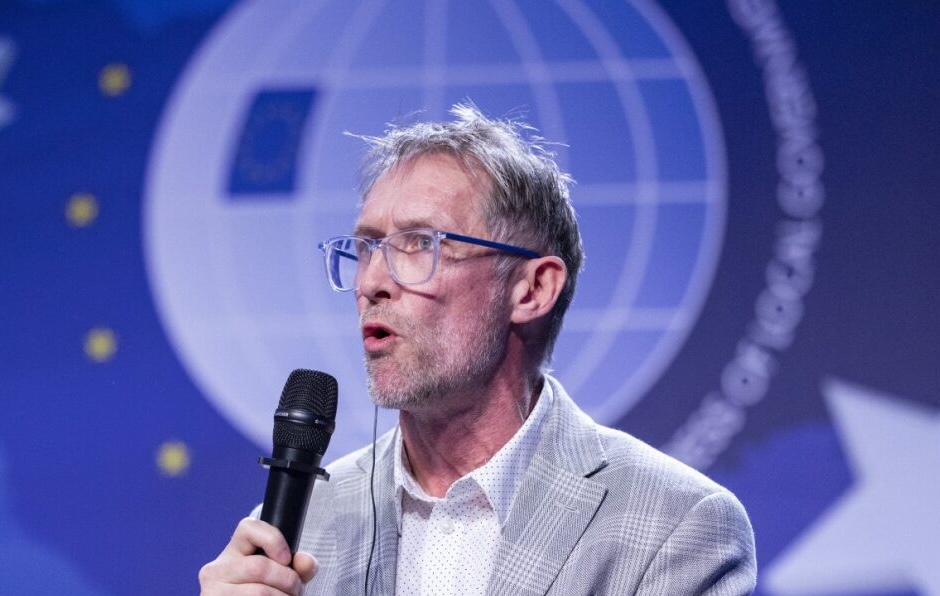Manchester – Does the way we elect our politicians really represent the people of Britain?
Willie Sullivan, Senior Director of Electoral Reform Society, led an important discussion for the many of us that believe that "Politics is Broken".
On Wednesday 24th April 2024 Politics in Pubs Manchester met at the Welcome Inn, Bury Old Road, Whitefield, M45 6TA (see here for location).
We were delighted to welcome Willie Sullivan, Senior Director (Campaigns and Scotland) at the Electoral Reform Society.
Introduction
Willie started by explaining that the Electoral Reform Society was formed in 1884, beginning life as a Victorian learned society. It is principally concerned with how electoral votes are turned into parliamentary seats. The Society’s founder Sir John Lubbock wanted “a House of Commons which shall really represent the nation”.
Free to criticise
In the late 1970s, the Society founded a small-scale ballot services division, a leading provider of software and services for election management, membership engagement, democracy and governance systems. The division was sold in 2018 – the capital supporting the work of the Electoral Reform Society. This financial independence leaves the Society and its 130,000 members free to criticise all political parties on behalf of voters. The Society’s website states:
For over 130 years we have been at the forefront of political change, putting voters first, highlighting problems and offered common sense solutions. We remain the world’s oldest organisation concerned with elections and political reform, recognised by the United Nations for over 30 years. We know that every year that passes with our steam age political system still in place is a missed opportunity for the people of Britain. Our vision is a representative democracy fit for the 21st century.
Updated electoral system
Willie started the discussion by asking the following questions:
- Does the way we elect our politicians really represent the people of Britian?
- Are there people like you in parliament, do you feel they understand what it’s like to live your life, deal with your problems ?
- Have they got your interests and concerns at heart?
- Or are there other, more powerful groups that they seem to be much more interested in representing?
His view is that if this is the problem surely the way we choose our representatives could help or hinder this. The basic way we choose our MPs (who gets the most votes for, regardless of how many voted against) has not changed for hundreds of years. It’s not the answer to everything but an updated electoral system is an essential foundation on which to build a much better democracy.
Contest of ideas
Britain’s system of democracy is relatively young – the right to vote was not given to all adults until 1928 – but in Willie’s view, it is resilient. However, the advent of technology has altered much about the way in which society is organised (see David Runciman’s ‘The Confidence Trap’). Mainstream media is no longer the main source of information – now all internet users can exchange their thoughts and opinions in the contest of ideas we call ‘politics’. This has led to a fracturing of shared understandings. We no longer trust our political leaders nor our institutions because we cannot be sure that they are representing our interests in Parliament.
First past the post
The lack of trust in politicians and failing public services creates a disconnect between voters and the people elected to represent their interests. We sometimes feel that our representatives are not even trying to represent our interests.
The British electoral system still operates on a ‘First past the post’ model. The trouble is, most voters end up with a government the majority didn’t vote for. For example, at the 2019 General Election the Conservative party won an 80 seat majority with only 43% of the vote. Power appears to sit elsewhere – such as with corporations and lobbyists. There appears to be contempt for the ordinary British voter and a cartoonish understanding of how they live their lives.
Proportional Representation (PR)
If parliamentary seats better reflected how people vote, their incumbents might be incentivised to act in our interests. The Electoral Reform Society’s vision is for the British elections to adopt the Proportional Representation model – where the number of seats held is proportional to the distribution of votes. So-called ‘safe seats’ would become a thing of the past. Additionally, Citizens Assemblies could enable politicians to better understand what voters require of them.
Discussion
- Our politicians are incompetent – ministers are not controlling their departments and seem incapable of managing the special interest groups such as those with a vested interest in Covid, Net Zero, Ukraine and Israel. They lack the life experience for dealing with so-called ‘experts’, unlike former heavyweight politicians like Dennis Healey and Ted Heath.
- Political debate has become polarised, partly because of social media. It used to address what people wanted from their politicians – now it is concerned with identity politics i.e. what you are, which is much more personal.
- PR would rectify issues such as the 2015 General Election which saw 4 million votes for UKIP resulting in one parliamentary seat. However, it would also result in a lot of coalitions.
- Citizens Assemblies sound like a good idea but they can be skewed by people with an agenda. A recent example is the exclusion of candidate Nick Buckley from the Greater Manchester Mayoral Election hustings event.
- The 2019 General Election showed no safe seats anymore. Boris Johnson had a big idea re: Brexit and levelling up and secured many red wall seats. There is currently no party with big ideas.
- There are too many graduates in politics lacking in life experience, and they are too influenced by social media. They do not have the technical know-how to deal with complex issues like Net Zero, Covid lockdowns and the Iraq war, nor an understanding of how trillions of pounds of taxpayers’ money is being wasted on solving non-existent problems. Changing the electoral system won’t alter that.
- The problem is not with the electoral system, it is with the lack of accountability for delivering on manifesto promises e.g. Brexit, which has still not been delivered. Would PR address that?
- Voters are sick and tired of politicians not doing what they were elected for. The political parties decide what we can vote for according to their vested interests. They have a vested interest in not having PR.
- PR would involve much horse-trading to get a government and a manifesto in place. How would they decide whose leader would be PM? Changing the electoral system wouldn’t solve anything, it’s the policies which count. The Brexit referendum showed that the people can change things.
- Politicians are contemptuous of the electorate. Bury South’s MP crossed the floor without a by-election. The vast majority of voters are thinking people. There should be a wide participation in political debate.
- Where are the conviction politicians like Frank Fields and Tony Benn? Too many MPs are turgid and bland. Some voters are losing confidence in the political parties and are voting for individual characters. With PR, candidates are centrally chosen. The focus has shifted from sales (i.e. buy my policies) to marketing (i.e. what policies would you like?). There should be state-funded parties.
- There are issues with students and young professionals who seem unable to tolerate discussion of topics like immigration and Net Zero. How do we address the tribes and echo chambers to enable the exchange of ideas and opinions without shutting each other down?
- Referenda would help to improve direct accountability.
- Citizens Assemblies could present one narrative – it depends on what the question is and how it is asked. The media needs to represent all points of view.
- Robert F. Kenndy recommends that voting is done by blockchain.
Willie responded:
- Parties must deliver their big ideas – why haven’t the Conservatives delivered for the red wall? There is no easy answer to the complications of power. It is good to have an intention to counter it in the interests of the people. There are not as many safe seats now. There is a massive state capture by lobbyists. PR is not perfect. Some coalitions are more open than others – the problem for voters is not knowing which aspects of which manifesto they would get.
- The Electoral Reform Society lobbies MPs regarding making the electoral system more representative of the votes cast.
- PR wouldn’t solve the accountability issue.
- Politicians don’t trust the electorate.
- The current culture of politics and its incumbents is not good. Seats should closely represent the way people vote. The establishment (i.e. networks, interests and power) is very difficult to challenge although it is possible.
- Face to face discussions are always the best way of listening to each other. Citizens Assemblies usually have 120 representatives and are specifically selected to match the demographics, etc, of the population they are meant to represent.
- A crisis might change minds about the need for PR. The electorate would vote on who goes on the candidate lists. Seats won should reflect the votes cast.
- Blockchain technology might improve electoral security.
Thank you so much, Willie, for introducing the Electoral Reform Society to Politics in Pubs Manchester, and leading a thought-provoking discussion about proportional representation. As always, a big thank you to our lovely hosts at The Welcome Inn. Cheers all!
Find out more about the Electoral Reform Society:
Forthcoming dates
Manchester – Cancelling Cancel Culture, Sunday 19th May 2024 2pm
Cancelling Cancel Culture presents “How to Defeat Cancel Culture…. A Workshop’. Please join us at the Briton’s Protection, Manchester from 2pm.
https://www.meetup.com/cancelling-cancel-culture-meetup/events/300154995/
Manchester – Politics in Pubs Wednesday, 22nd May 2024 7.30pm
Politics in Pubs welcomes David Milne, vice chair of Greater Manchester Humanists. David will lead a discussion entitled: Social Justice? Pandemics and Reality, a discussion about why science, rational thought and understanding the Illusion of free will is vital for human survival into the 21st century – and beyond.
Manchester – Comedy Unleashed, Thursday 6th June 2024 7pm
In its first ever Manchester gig, Comedy Unleashed presents a relaxed evening of free-thinking comedy with comedians who don’t self-censor. With: Andrew Doyle, Josh Howie, Elaine Miller, and Francis Foster. Doors open 6pm. Venue: Impossible, 36 Peter Street, Manchester M2 5QR. Tickets available on the link below:
https://comedyunleashed.co.uk/manchester-gigs/
We are growing!
We are expanding our activities via regional Politics in Pubs groups and have created a map where you can search for a group near you. If you live near Salisbury or Northampton we have members who wants to start new groups in those towns, so please let us know if this of interest.
Don’t worry if you can’t find anything nearby as you can start your own group. If you would like to be put in touch with other people interested in talking about politics, please reply to this email letting us know your location and we’ll help to get the conversation started.
We have also started to grow our network with other free speech groups who have a similar interest in open discussion and debate. If you have such a group and want to appear on our map please get in touch.

